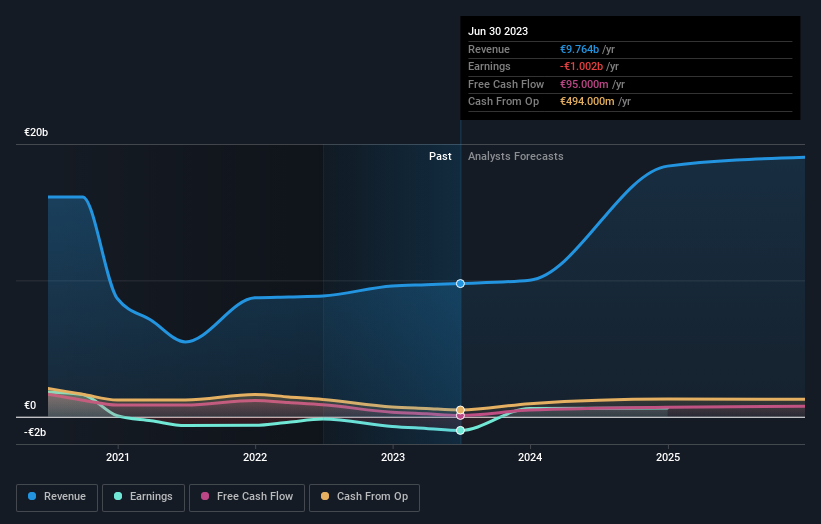
Today we're going to take a look at the well-established Vivendi SE (EPA:VIV). The company's stock received a lot of attention from a substantial price increase on the ENXTPA over the last few months. The company is now trading at yearly-high levels following the recent surge in its share price. As a large-cap stock with high coverage by analysts, you could assume any recent changes in the company’s outlook is already priced into the stock. However, what if the stock is still a bargain? Let’s examine Vivendi’s valuation and outlook in more detail to determine if there’s still a bargain opportunity.
Check out our latest analysis for Vivendi
What Is Vivendi Worth?
Great news for investors – Vivendi is still trading at a fairly cheap price. According to our valuation, the intrinsic value for the stock is €15.67, but it is currently trading at €10.47 on the share market, meaning that there is still an opportunity to buy now. Vivendi’s share price also seems relatively stable compared to the rest of the market, as indicated by its low beta. If you believe the share price should eventually reach its true value, a low beta could suggest it is unlikely to rapidly do so anytime soon, and once it’s there, it may be hard to fall back down into an attractive buying range.
What does the future of Vivendi look like?

Investors looking for growth in their portfolio may want to consider the prospects of a company before buying its shares. Although value investors would argue that it’s the intrinsic value relative to the price that matter the most, a more compelling investment thesis would be high growth potential at a cheap price. In Vivendi's case, its revenues over the next few years are expected to grow by 91%, indicating a highly optimistic future ahead. If expense does not increase by the same rate, or higher, this top line growth should lead to stronger cash flows, feeding into a higher share value.
What This Means For You
Are you a shareholder? Since VIV is currently undervalued, it may be a great time to increase your holdings in the stock. With an optimistic outlook on the horizon, it seems like this growth has not yet been fully factored into the share price. However, there are also other factors such as capital structure to consider, which could explain the current undervaluation.
Are you a potential investor? If you’ve been keeping an eye on VIV for a while, now might be the time to make a leap. Its prosperous future outlook isn’t fully reflected in the current share price yet, which means it’s not too late to buy VIV. But before you make any investment decisions, consider other factors such as the strength of its balance sheet, in order to make a well-informed buy.
In light of this, if you'd like to do more analysis on the company, it's vital to be informed of the risks involved. Every company has risks, and we've spotted 2 warning signs for Vivendi (of which 1 is significant!) you should know about.
If you are no longer interested in Vivendi, you can use our free platform to see our list of over 50 other stocks with a high growth potential.
New: Manage All Your Stock Portfolios in One Place
We've created the ultimate portfolio companion for stock investors, and it's free.
• Connect an unlimited number of Portfolios and see your total in one currency
• Be alerted to new Warning Signs or Risks via email or mobile
• Track the Fair Value of your stocks
Have feedback on this article? Concerned about the content? Get in touch with us directly. Alternatively, email editorial-team (at) simplywallst.com.
This article by Simply Wall St is general in nature. We provide commentary based on historical data and analyst forecasts only using an unbiased methodology and our articles are not intended to be financial advice. It does not constitute a recommendation to buy or sell any stock, and does not take account of your objectives, or your financial situation. We aim to bring you long-term focused analysis driven by fundamental data. Note that our analysis may not factor in the latest price-sensitive company announcements or qualitative material. Simply Wall St has no position in any stocks mentioned.
About ENXTPA:VIV
Vivendi
Operates in the content, media, and entertainment industries in France, rest of Europe, the Americas, Asia/Oceania, and Africa.
Moderate growth potential with worrying balance sheet.
Similar Companies
Market Insights
Community Narratives



